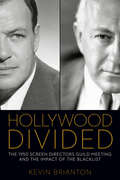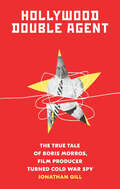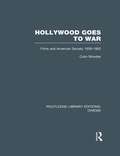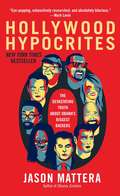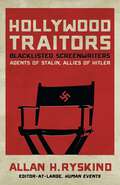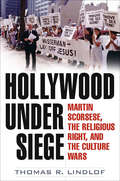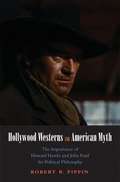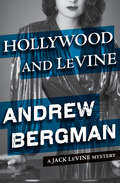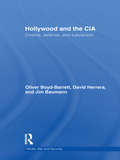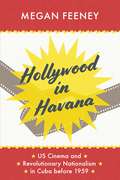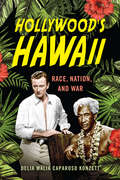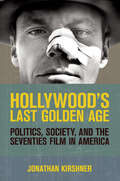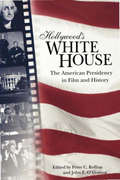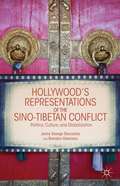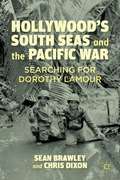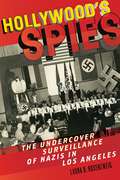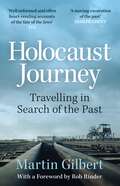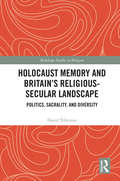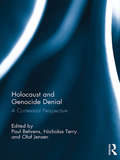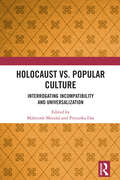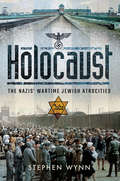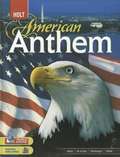- Table View
- List View
Hollywood Divided: The 1950 Screen Directors Guild Meeting and the Impact of the Blacklist (Screen Classics)
by Kevin Brianton“Brianton’s well-documented study of a Hollywood controversy delves into one example of the post-WWII Red Scare” (Publishers Weekly).On October 22, 1950, the Screen Directors Guild (SDG) gathered for a meeting at the opulent Beverly Hills Hotel. Among the group’s leaders were some of the most powerful men in Hollywood—John Ford, Cecil B. DeMille, Joseph L. Mankiewicz, John Huston, Frank Capra, William Wyler, and Rouben Mamoulian—and the issue on the table was nothing less than a vote to dismiss Mankiewicz as the guild’s president after he opposed an anticommunist loyalty oath that could have expanded the blacklist. The dramatic events of that evening have become mythic, and the legend has overshadowed the more complex realities of this crucial moment in Hollywood history.In Hollywood Divided, Kevin Brianton explores the myths associated with the famous meeting and the real events that they often obscure. He analyzes the lead-up to that fateful summit, examining the pressure exerted by the House Un-American Activities Committee. Brianton reveals the internal politics of the SDG, its initial hostile response to the HUAC investigations, the conservative reprisal, and the influence of the oath on the guild and the film industry as a whole. Hollywood Divided also assesses the impact of the historical coverage of the meeting on the reputation of the three key players in the drama.Brianton’s study is a provocative and revealing revisionist history of the SDG’s 1950 meeting and its lasting repercussions on the film industry as well as the careers of those who participated. Hollywood Divided illuminates how both the press's and the public's penchant for the “exciting story” have perpetuated fabrications and inaccurate representations of a turning point for the film industry.Huffington Post Best Film Books of 2016Praise for Hollywood Divided“An authoritative reassessment of the meetings held by the Screen Directors Guild in 1950 to consider the adoption of a loyalty oath. Brianton traces the implications for the film industry and the reputations of key filmmakers, including Cecil DeMille and John Ford. He also offers sharp and illuminating reflections on the making of Hollywood history and myth.” —Brian Neve, author of The Many Lives of Cy Endfield: Film Noir, the Blacklist and Zulu“A breakthrough book on a topic that historians, for the most part, have considered settled. Brianton’s landmark study is fresh, thorough, and balanced, a model of Hollywood historiography. In clear prose, he takes the reader through the detailed twists and turns that created both the myth and the subsequent legend of the fateful Directors Guild Meeting that occurred during a critical time in American history.” —James D’Arc, Curator, Cecil B. DeMille Papers, Brigham Young University
Hollywood Double Agent: The True Tale of Boris Morros, Film Producer Turned Cold War Spy
by Jonathan GillThis true story of Golden Age Hollywood and Cold War espionage is a “captivating, fast-paced narrative [that] reads like a thriller” (Library Journal). Boris Morros was a major figure in the 1930s and ’40s. The head of music at Paramount, nominated for Academy Awards, he then went on to produce his own films with Laurel and Hardy, Fred Astaire, Henry Fonda, and others. But as J. Edgar Hoover would discover, these successes were a cover for one of the most incredible espionage tales in the history of the Cold War—Boris Morros also worked for Russian intelligence.Morros’s assignments took him to the White House, the Vatican, and deep behind the Iron Curtain. The high-level intel he provided the KGB included military secrets and compromising information on prominent Americans: his friends. But in 1947, Morros flipped. At the height of the McCarthy era, he played a leading role in a deadly tale. Jonathan Gill’s Hollywood Double Agent is an extraordinary story about Russian spies at the heart of American culture and politics, and one man caught in the middle of the Cold War.“Well-written and perceptive . . . Morros was an empty vessel who could be turned left or right depending on how it satisfied his personal interest.” —New York Journal of Books“Reads like an espionage thriller . . . with malevolent, powerful—and sometimes bumbling—characters.” —Kirkus Reviews“A fascinating and swift-reading biography.” —The Wall Street Journal
Hollywood Goes to War: Films and American Society, 1939-1952 (Routledge Library Editions: Cinema)
by Colin ShindlerA historian’s view of the relationship between American history and the American film industry, this book is a witty and perceptive account of Hollywood and its films in the years from the outbreak of the Second World War in Europe to the end of the war in Korea, It describes how film makers and their industry were shaped by and responded to the strong political and social stimuli of wartime America. The author examines the recurring question of whether the movies were a reflection of the society in which they were produced, or whether by virtue of their undeniable propaganda power the films shaped that society. Combining evidence from literary, visual and oral sources, he covers a wide range of movies, emphasising in particular Casablanca, Mrs Miniver, The Best Years of Our Lives and Since You Went Away. In addition to placing the films in a social and political context, the author shows that Hollywood is a perfect example of the bone-headed way in which people behave when they are dealing with large amounts of money and power. Enjoyably nostalgic, this book will appeal to film enthusiasts as well as those interested in war and its effect on society.
Hollywood Hypocrites
by Jason MatteraTHE BOOK YOU'RE ABOUT TO READ WILL PISS YOU OFF. Are you sick of self-important celebrities preaching against "global warming," yet flying private planes to their countless homes? Fed up with lectures about charity and philanthropy from miserly rockers who will do anything for a tax break? Disgusted by leftist stars decrying the evils of the Second Amendment as their personal bodyguards pack more heat than a Chuck Norris kick to the face? The same Hollywood loons who got Barack Hussein Obama elected in 2008 will do so again in 2012. That is, unless we muzzle them. Four years ago, Republicans sat back like wimps and let Obama's celebrity-fueled cool machine steamroll them into electoral smithereens. This time, we must do the steamrolling. New York Times bestselling author of Obama Zombies and gonzo journalist Jason Mattera takes the first stand with Hollywood Hypocrites, as he slays the Left's sacred celebrity cows and teaches Obama's Tinseltown foot soldiers their most important lesson yet: No longer can they attempt to deny Americans the very liberties they use to catapult themselves to prosperity and stardom. In his trademark eye-opening, no-holds-barred, and hilarious style, Mattera puts scores of A-list celebrities, including Sting, Madonna, Bono, Al Gore, Alec Baldwin, Matt Damon, Cameron Diaz, Bruce Springsteen, and many, many more under the microscope to analyze whether they live by the same environmental, health, anti-violence, civil rights, and other policy prescriptions they seek to inflict on Americans. What he uncovers will shock you. Hollywood's megaphone is powerful, and the mainstream media's love affair with the president will roar back with a vengeance when their guy is against the wall. Anyone who thinks Barack Obama's abysmal first term will be enough to demoralize the Liberal Left Coast from flexing its mediated political muscle is a fool. It's time to recognize the marketing and fund-raising power the Hollywood Progressives wield. It's time to dig into the data and set the record straight. It's time to turn the media spotlight back on the image makers and prevent the Hollywood elite from hoodwinking American voters once again.
Hollywood Traitors: Blacklisted Screenwriters - Agents of Stalin, Allies of Hitler
by Allan H. RyskindAllan Ryskind, son of Marx Brothers screenwriter Morrie Ryskind (Animal Crackers, A Night at the Opera, Room Service), exposes the ugly truth about the Communists blacklisted from the film industry. Too often, the "Hollywood Ten" brought before the House Un-American Activities Committee are memorialized as victims of an unjust witch-hunt and heroes who stood up for free speech. The truth is shocking: Not only did these supposed liberal paragons adore Josef Stalin and take their orders directly from the Communist Party, but they also sympathized with Adolf Hitler. <P><P>Ryskind, who grew up in the heart of the Hollywood scene and personally knew many of the key players in this real-life Hollywood drama, has penned a definitive, myth-busting account of the Hollywood Ten and Hollywood Blacklist that will forever change the way you think about the ideological battle waged in the movie capital of the world. With glossy photographs.
Hollywood Under Siege: Martin Scorsese, the Religious Right, and the Culture Wars
by Thomas R. LindlofA behind-the-scenes look at the making of The Last Temptation of Christ and the controversy following its release.In 1988, director Martin Scorsese fulfilled his lifelong dream of making a film about Jesus Christ. Rather than celebrating the film as a statement of faith, churches and religious leaders immediately went on the attack, alleging blasphemy. At the height of the controversy, thousands of phone calls a day flooded the Universal switchboard, and before the year was out, more than three million mailings protesting the film fanned out across the country. For the first time in history, a studio took responsibility for protecting theaters and scrambled to recruit a “field crisis team” to guide The Last Temptation of Christ through its contentious American openings. Overseas, the film faced widespread censorship actions, with thirteen countries eventually banning the film. The response in Europe turned violent when opposition groups sacked theaters in France and Greece and caused injuries to dozens of moviegoers.Twenty years later, author Thomas R. Lindlof offers a comprehensive account of how this provocative film came to be made and how Universal Pictures and its parent company MCA became targets of the most intense, unremitting attacks ever mounted against a media company. The film faced early and determined opposition from elements of the religious Right when it was being developed at Paramount during the last year the studio was run by the celebrated troika of Barry Diller, Michael Eisner, and Jeffrey Katzenberg. By the mid-1980s, Scorsese’s film was widely regarded as unmakeable?a political stick of dynamite that no one dared touch. Through the joint efforts of two of the era’s most influential executives, CAA president Michael Ovitz and Universal Pictures chairman Thomas P. Pollock, this improbable project found its way into production. The making of The Last Temptation of Christ caught evangelical Christians at a moment when they were suffering a crisis of confidence in their leadership. The religious right seized on the film as a way to rehabilitate its image and to mobilize ordinary citizens to attack liberalism in art and culture. The ensuing controversy over the film’s alleged blasphemy escalated into a full-scale war fought out very openly in the media. Universal/MCA faced unprecedented calls for boycotts of its business interests, anti-Semitic rhetoric and death threats were directed at MCA chairman Lew Wasserman and other MCA executives, and the industry faced the specter of violence at theaters.Hollywood Under Siege draws upon interviews with many of the key figures?Martin Scorsese, Paul Schrader, Michael Ovitz, Jeffrey Katzenberg, Jack Valenti, Thomas P. Pollock, and Willem Dafoe?to explore the trajectory of the film from its conception to the subsequent epic controversy and beyond. Lindlof offers a fascinating dissection of a critical episode in the embryonic culture wars, illuminating the explosive effects of the clash between the interests of the media industry and the forces of social conservatism.Praise for Hollywood Under Siege“No other book has traced the development of a major motion picture from conception through production to reception with the kind of care and detail that Lindlof does here. Hollywood Under Siege provides valuable insight into the machinery of the film industry, and into the machinations of American culture on a broader front as well.” —Thomas Schatz, author of The Genius of the System: Hollywood Filmmaking in the Studio Era and Executive Director of the University of Texas Film Institute“Riveting and accurate. Even though I thought I knew the events, I found myself captured anew.” —Paul Schrader, screenwriter and director“As a study of a landmark moment in American cinema, Lindlof’s book is both profound and extremely entertaining.” —Los Angeles Times“Lindlof has meticulously researched the histo
Hollywood Westerns and American Myth: The Importance of Howard Hawks and John Ford for Political Philosophy
by Robert B. PippinIn this pathbreaking book one of America's most distinguished philosophers brilliantly explores the status and authority of law and the nature of political allegiance through close readings of three classic Hollywood Westerns: Howard Hawks' Red River and John Ford's The Man Who Shot Liberty Valance and The Searchers. Robert Pippin treats these films as sophisticated mythic accounts of a key moment in American history: its "second founding," or the western expansion. His central question concerns how these films explore classical problems in political psychology, especially how the virtues of a commercial republic gained some hold on individuals at a time when the heroic and martial virtues were so important. Westerns, Pippin shows, raise central questions about the difference between private violence and revenge and the state's claim to a legitimate monopoly on violence, and they show how these claims come to be experienced and accepted or rejected. Pippin's account of the best Hollywood Westerns brings this genre into the center of the tradition of political thought, and his readings raise questions about political psychology and the political passions that have been neglected in contemporary political thought in favor of a limited concern with the question of legitimacy.
Hollywood and LeVine (The Jack LeVine Mysteries #2)
by Andrew BergmanA trip to the West Coast lands Jack LeVine in a tangled Hollywood murder webAfter nearly a decade of churning out hits, Warner Bros. screenwriter Walter Adrian wants a raise on his weekly $2,500 salary. He thinks a thousand dollars more is fair—but the studio&’s counteroffer is low, and dropping fast. Something is wrong, and he thinks it may have to do with communism. Though he insists he isn&’t a Red, Adrian has no way of proving it. He flees to New York to ask the advice of high school buddy Jack LeVine, private eye. LeVine is broke, and has no sympathy for his wealthy friend, but he agrees to fly West to investigate his old classmate&’s trouble. When he arrives, Adrian hangs dead from the gallows at the Western set on the Warners&’ backlot. Behind his friend&’s death LeVine finds a shadowy Cold War conspiracy, and a city far darker than anything Hollywood puts on screen.
Hollywood and the CIA: Cinema, Defense and Subversion (Media, War and Security)
by Oliver Boyd Barrett David Herrera James A. BaumannThis book investigates representations of the Central Intelligence Agency (CIA) in Hollywood films, and the synergies between Hollywood product, U.S. military/defense interests and U.S. foreign policy. As probably the best known of the many different intelligence agencies of the US, the CIA is an exceptionally well known national and international icon or even "brand," one that exercises a powerful influence on the imagination of people throughout the world as well as on the creative minds of filmmakers. The book examines films sampled from five decades - the 1960s, 1970s, 1980s, 1990s and 2000s - and explores four main issues: the relative prominence of the CIA; the extent to which these films appeared to be overtly political; the degree to which they were favorable or unfavorable to the CIA; and their relative attitude to the "business" of intelligence. A final chapter considers the question: do these Hollywood texts appear to function ideologically to "normalize" the CIA? If so, might this suggest the further hypothesis that many CIA movies assist audiences with reconciling two sometimes fundamental opposites: often gruesome covert CIA activity for questionable goals and at enormous expense, on the one hand, and the values and procedures of democratic society, on the other. This interdisciplinary book will be of much interest to students of the CIA/Intelligence Studies, media and film studies, US politics and IR/Security Studies in general.
Hollywood in Havana: US Cinema and Revolutionary Nationalism in Cuba before 1959
by Megan FeeneyFrom the turn of the twentieth century through the late 1950s, Havana was a locus for American movie stars, with glamorous visitors including Errol Flynn, John Wayne, and Marlon Brando. In fact, Hollywood was seemingly everywhere in pre-Castro Havana, with movie theaters three to a block in places, widely circulated silver screen fanzines, and terms like “cowboy” and “gangster” entering Cuban vernacular speech. Hollywood in Havana uses this historical backdrop as the catalyst for a startling question: Did exposure to half a century of Hollywood pave the way for the Cuban Revolution of 1959? Megan Feeney argues that the freedom fighting extolled in American World War II dramas and the rebellious values and behaviors seen in postwar film noir helped condition Cuban audiences to expect and even demand purer forms of Cuban democracy and national sovereignty. At the same time, influential Cuban intellectuals worked to translate Hollywood ethics into revolutionary rhetoric—which, ironically, led to pointed critiques and subversions of the US presence in Cuba. Hollywood in Havana not only expands our notions of how American cinema was internalized around the world—it also broadens our view of the ongoing history of US-Cuban interactions, both cultural and political.
Hollywood's Hawaii: Race, Nation, and War
by Delia Malia KonzettWhether presented as exotic fantasy, a strategic location during World War II, or a site combining postwar leisure with military culture, Hawaii and the South Pacific figure prominently in the U.S. national imagination. Hollywood’s Hawaii is the first full-length study of the film industry’s intense engagement with the Pacific region from 1898 to the present. Delia Malia Caparoso Konzett highlights films that mirror the cultural and political climate of the country over more than a century—from the era of U.S. imperialism on through Jim Crow racial segregation, the attack on Pearl Harbor and WWII, the civil rights movement, the contemporary articulation of consumer and leisure culture, as well as the buildup of the modern military industrial complex. Focusing on important cultural questions pertaining to race, nationhood, and war, Konzett offers a unique view of Hollywood film history produced about the national periphery for mainland U.S. audiences. Hollywood’s Hawaii presents a history of cinema that examines Hawaii and the Pacific and its representations in film in the context of colonialism, war, Orientalism, occupation, military buildup, and entertainment.
Hollywood's Last Golden Age: Politics, Society, and the Seventies Film in America
by Jonathan KirshnerBetween 1967 and 1976 a number of extraordinary factors converged to produce an uncommonly adventurous era in the history of American film. The end of censorship, the decline of the studio system, economic changes in the industry, and demographic shifts among audiences, filmmakers, and critics created an unprecedented opportunity for a new type of Hollywood movie, one that Jonathan Kirshner identifies as the "seventies film." In Hollywood's Last Golden Age, Kirshner shows the ways in which key films from this period-including Chinatown, Five Easy Pieces, The Graduate, and Nashville, as well as underappreciated films such as The Friends of Eddie Coyle, Klute, and Night Moves-were important works of art in continuous dialogue with the political, social, personal, and philosophical issues of their times.These "seventies films" reflected the era's social and political upheavals: the civil rights movement, the domestic consequences of the Vietnam war, the sexual revolution, women's liberation, the end of the long postwar economic boom, the Shakespearean saga of the Nixon Administration and Watergate. Hollywood films, in this brief, exceptional moment, embraced a new aesthetic and a new approach to storytelling, creating self-consciously gritty, character-driven explorations of moral and narrative ambiguity. Although the rise of the blockbuster in the second half of the 1970s largely ended Hollywood's embrace of more challenging films, Kirshner argues that seventies filmmakers showed that it was possible to combine commercial entertainment with serious explorations of politics, society, and characters' interior lives.
Hollywood's White House: The American Presidency in Film and History
by Peter C. Rollins and John E. O’ConnorFrom action flicks to biopics to SNL skits, how presidents are portrayed on screen: &“An interesting study of the real presidency and the reel presidency.&” —USA Today Magazine Winner of the Popular Culture Association&’s Ray and Pat Browne Book Award Whether serious or satirical, biographical or fictional, the ways that US presidents are depicted in popular culture reveal much about us as a nation. The contributors to Hollywood&’s White House examine the historical accuracy of presidential depictions, illuminate their influence, and uncover how they reflect the concerns of their times and the social and political visions of the filmmakers. With reflections on portrayals of Washington, Adams, Lincoln, FDR, Nixon, and more, this volume, which includes a comprehensive filmography and a bibliography, is ideal for both historians and film enthusiasts. &“An engaging collection.&” —Robert Brent Toplin, author of Reel History: In Defense of Hollywood
Hollywood’s Representations of the Sino-Tibetan Conflict
by Jenny George DaccacheUsing film as a lens though which we can witness the global transformations in politics, economy, culture, and communication, this book analyzes Hollywood's shift in its depictions of China and Tibet.
Hollywood’s South Seas and the Pacific War
by Chris Dixon Sean BrawleyThis book explores the expectations, experiences, and reactions of Allied servicemen and women who served in the wartime Pacific and viewed the South Pacific through the lens of Hollywood's South Seas. Based on extensive archival research, it explores the intersections between military experiences and cultural history.
Hollywood’s Spies: The Undercover Surveillance of Nazis in Los Angeles (Goldstein-Goren Series in American Jewish History #11)
by Laura B RosenzweigThe remarkable story of the Jewish moguls in Hollywood who established the first anti-Nazi Jewish resistance organization in the country in the 1930s.Finalist, Celebrate 350 Award in American Jewish Studies The 1939 film Confessions of a Nazi Spy may have been the first cinematic shot fired by Hollywood against Nazis in America, but it by no means marked the political awakening of the film industry&’s Jewish executives to the problem. Hollywood&’s Spies tells the remarkable story of the Jewish moguls in Hollywood who paid private investigators to infiltrate Nazi groups operating in Los Angeles, establishing the first anti-Nazi Jewish resistance organization in the country—the Los Angeles Jewish Community Committee (LAJCC). Drawing on more than 15,000 pages of archival documents, Laura B. Rosenzweig offers a compelling narrative illuminating the role that Jewish Americans played in combating insurgent Nazism in the United States in the 1930s. Forced undercover by the anti-Semitic climate of the decade, the LAJCC partnered with organizations whose Americanism was unimpeachable, such as the American Legion, to channel information regarding seditious Nazi plots to Congress, the Justice Department, the FBI and the Los Angeles Police Department.Hollywood&’s Spies corrects the decades-long belief that American Jews lacked the political organization and leadership to assert their political interests during this period in our history and reveals that the LAJCC was one of many covert &“fact finding&” operations funded by Jewish Americans designed to root out Nazism in the United States. &“A remarkable tale.&” —The Wall Street Journal &“Expose[s] a buried story about underground plots waged by Nazis against major Hollywood figures.&” —Los Angeles Review of Books
Holocaust Journey: Travelling In Search Of The Past
by Sir Martin GilbertIncludes a new foreword by Rob RinderWhat readers are saying about HOLOCAUST JOURNEY:'Brilliant ... A must read for everybody' ⭐⭐⭐⭐⭐'Devastating' ⭐⭐⭐⭐⭐'Fascinating, thought provoking and shocking' ⭐⭐⭐⭐⭐'Everybody should read this' ⭐⭐⭐⭐⭐'Informative and emotional' ⭐⭐⭐⭐⭐In June 1996 Martin Gilbert took a group of students on a two-week journey across middle-Europe which encompassed all the major places in the Holocaust - from Wannsee where the extermination of the Jews was decreed, to the camps themselves, via deserted Jewish communities and synagogues as well as the sites of the ghettos and deportation.'The achievement of Gilbert's HOLOCAUST JOURNEY is to reduce to comprehensible, human terms of the scale of the genocide that to many is still unimaginable' LITERARY REVIEW'Filled with short, well-informed and often heart-rending accounts of the fate of the Jews' TLS'HOLOCAUST JOURNEY travels along the tracks of a history we would rather forget to the sites of wartime horror, and is also a moving excavation of the past' INDEPENDENT
Holocaust Journey: Travelling In Search Of The Past
by Sir Martin GilbertIncludes a new foreword by Rob RinderWhat readers are saying about HOLOCAUST JOURNEY:'Brilliant ... A must read for everybody' ⭐⭐⭐⭐⭐'Devastating' ⭐⭐⭐⭐⭐'Fascinating, thought provoking and shocking' ⭐⭐⭐⭐⭐'Everybody should read this' ⭐⭐⭐⭐⭐'Informative and emotional' ⭐⭐⭐⭐⭐In June 1996 Martin Gilbert took a group of students on a two-week journey across middle-Europe which encompassed all the major places in the Holocaust - from Wannsee where the extermination of the Jews was decreed, to the camps themselves, via deserted Jewish communities and synagogues as well as the sites of the ghettos and deportation.'The achievement of Gilbert's HOLOCAUST JOURNEY is to reduce to comprehensible, human terms of the scale of the genocide that to many is still unimaginable' LITERARY REVIEW'Filled with short, well-informed and often heart-rending accounts of the fate of the Jews' TLS'HOLOCAUST JOURNEY travels along the tracks of a history we would rather forget to the sites of wartime horror, and is also a moving excavation of the past' INDEPENDENT
Holocaust Memory and Britain’s Religious-Secular Landscape: Politics, Sacrality, And Diversity (Routledge Studies in Religion)
by David TollertonBritish state-supported Holocaust remembrance has dramatically grown in prominence since the 1990s. This monograph provides the first substantial discussion of the interface between public Holocaust memory in contemporary Britain and the nation’s changing religious-secular landscape. In the first half of the book attention is given to the relationships between remembrance activities and Jewish, Muslim, Christian, and post-Christian communities. Such relationships are far from monolithic, being entangled in diverse histories, identities, power-structures, and notions of ‘British values’. In the book’s second half, the focus turns to ways in which public initiatives concerned with Holocaust commemoration and education are intertwined with evocations and perceptions of the sacred. Three state-supported endeavours are addressed in detail: Holocaust Memorial Day, plans for a major new memorial site in London, and school visits to Auschwitz. Considering these phenomena through concepts of ritual, sacred space, and pilgrimage, it is proposed that response to the Holocaust has become a key feature of Britain’s 21st century religious-secular landscape. Critical consideration of these topics, it is argued, is necessary for both a better understanding of religious-secular change in modern Britain and a sustainable culture of remembrance and national self-examination. This is the first study to examine Holocaust remembrance and British religiosity/secularity in relation to one another. As such, it will be of keen interest to scholars of Religious Studies, Jewish studies and Holocaust Studies, as well as the Sociology of Religion, Material Religion and Secularism.
Holocaust and Conceptions of German: The Elephant in the Room (Holocaust Education – Historisches Lernen – Menschenrechtsbildung)
by Marc-Philip Hermann-CohenThe Holocaust is inseparable from the Israeli identities even seven decades following the atrocities during World War II, Israeli daily life is shaped by the horrible crimes committed by the Nazis. This book conceptualizes the intricacies of the Israeli identity in relation to learning German as a foreign language (GFL) in Israel throughout the course of history and the changing conception of Germany. This book includes an analysis of a selection of twenty-five GFL language books which reflect the stigmatization and tabooization of the Holocaust and also the qualitative analysis of a subject pool of 105 learners of GFL. The author finds that identities are co-constituted by four individualized Thought Styles, a concept borrowed from Ludwik Fleck. Thought Styles capture the individual perspective of the language learner’s view of Germany and are categorized in this thesis as German Engineering, Cold Germany, Neo-Nazi Germany, and The Other Germany. The research draws from discourse theory, critical psychology, and the oft-overlooked classical theory of Ludwik Fleck. Although the relationship between Germany and Israel has been amicable for the last six decades, the choice for Israelis to learn the language that was used by a nation that once attempted to eradicate the Jewish people is emotive and infinitely complex.
Holocaust and Genocide Denial: A Contextual Perspective
by Olaf Jensen Paul Behrens Nicholas TerryThis book provides a detailed analysis of one of the most prominent and widespread international phenomena to which criminal justice systems has been applied: the expression of revisionist views relating to mass atrocities and the outright denial of their existence. Denial poses challenges to more than one academic discipline: to historians, the gradual disappearance of the generation of eyewitnesses raises the question of how to keep alive the memory of the events, and the fact that negationism is often offered in the guise of historical 'revisionist scholarship' also means that there is need for the identification of parameters which can be applied to the office of the 'genuine' historian. Legal academics and practitioners as well as political scientists are faced with the difficulty of evaluating methods to deal with denial and must in this regard identify the limits of freedom of speech, but also the need to preserve the rights of victims. Beyond that, the question arises whether the law can ever be an effective option for dealing with revisionist statements and the revisionist movement. In this regard, Holocaust and Genocide Denial: A Contextual Perspective breaks new ground: exploring the background of revisionism, the specific methods devised by individual States to counter this phenomenon, and the rationale for their strategies. Bringing together authors whose expertise relates to the history of the Holocaust, genocide studies, international criminal law and social anthropology, the book offers insights into the history of revisionism and its varying contexts, but also provides a thought-provoking engagement with the challenging questions attached to its treatment in law and politics.
Holocaust vs. Popular Culture: Interrogating Incompatibility and Universalization
by Priyanka Das Mahitosh MandalHolocaust vs. Popular Culture debates and deconstructs the binary responses to the representation of the Holocaust in European and non-European forms of Popular Culture. The binary is defined in terms of "incompatibility" between the Holocaust and Popular Culture on the one hand and the "universalization" of the Holocaust memory through Popular Culture on the other. The book does emphasize the anti-representation argument. Nevertheless, the authors make a case for a productive understanding of "Holocaust Popular Culture" as contributing to the expansion of Holocaust studies as well as cultural studies in the transnational context. The book theorizes Popular Culture in broad terms and highlights the diversity of Holocaust Popular Culture mainly but not exclusively produced in the twenty-first century. This interdisciplinary collection covers a wide variety of Popular Culture genres including language, literature, films, television shows, soap operas, music, dance, social media, advertisements, comics, graphic novels, videogames, and museums. It studies the (mis)representation of the Holocaust trauma, not only across genres but also across nations (Western and Asian) and generations (from testimonial remembrance to post-memory). This book will be of interest to students and scholars from a wide range of disciplines and subjects, including Popular Culture, Holocaust studies, cultural studies, genocide studies, postcolonial and transnational studies, media and film studies, visual culture, games studies, race and ethnicity studies, memory studies, and Jewish studies.
Holocaust: The Nazis' Wartime Jewish Atrocities
by Stephen Wynn“Trace[s] the developing Holocaust from the Odessa Massacre . . . a very good point to start into understanding this terrible genocide.” —FiretrenchIn Holocaust, Stephen Wynn looks at the build up to the Second World War, from the time of Hitler’s appointment as Chancellor of Germany in January 1933, as the Nazi Party rose to power in a country that was still struggling to recover politically, socially and financially from the aftermath of the First World War, while at the same time, through the enactment of a number of laws, making life extremely difficult for German Jews. Some saw the dangers ahead for Jews in Germany and did their best to get out, some managed to do so, but millions more did not. The book then moves on to look at a wartime Nazi Germany and how the dislike of the Jews had gone from painting the star of David on shop windows, to their mass murder in the thousands of concentration camps that were scattered throughout Germany. As well as the camps, it looks at some of those who were culpable for the atrocities that were carried out in the name of Nazism. Not all those who were murdered lost their lives in concentration camps. Some were killed in massacres, some in ghettos and some by the feared and hated Einsatzgruppen.“Historical studies like Holocaust: The Nazis’ Wartime Jewish Atrocities are increasingly necessary to remind present and future generations of what can happen when the forces of bigotry and racially motivated hatred goes unchecked in even the most civilized of nations.” —Midwest Book Review
Holt American Anthem
by Edward L. Ayers Robert D. Schulzinger Jesús F. de la TejaNIMAC-sourced textbook
Holt American Anthem New York
by Edward L. Ayers Robert D. Schulzinger Jesús F. de la Teja Deborah Gray WhiteHolt American Anthem New York
